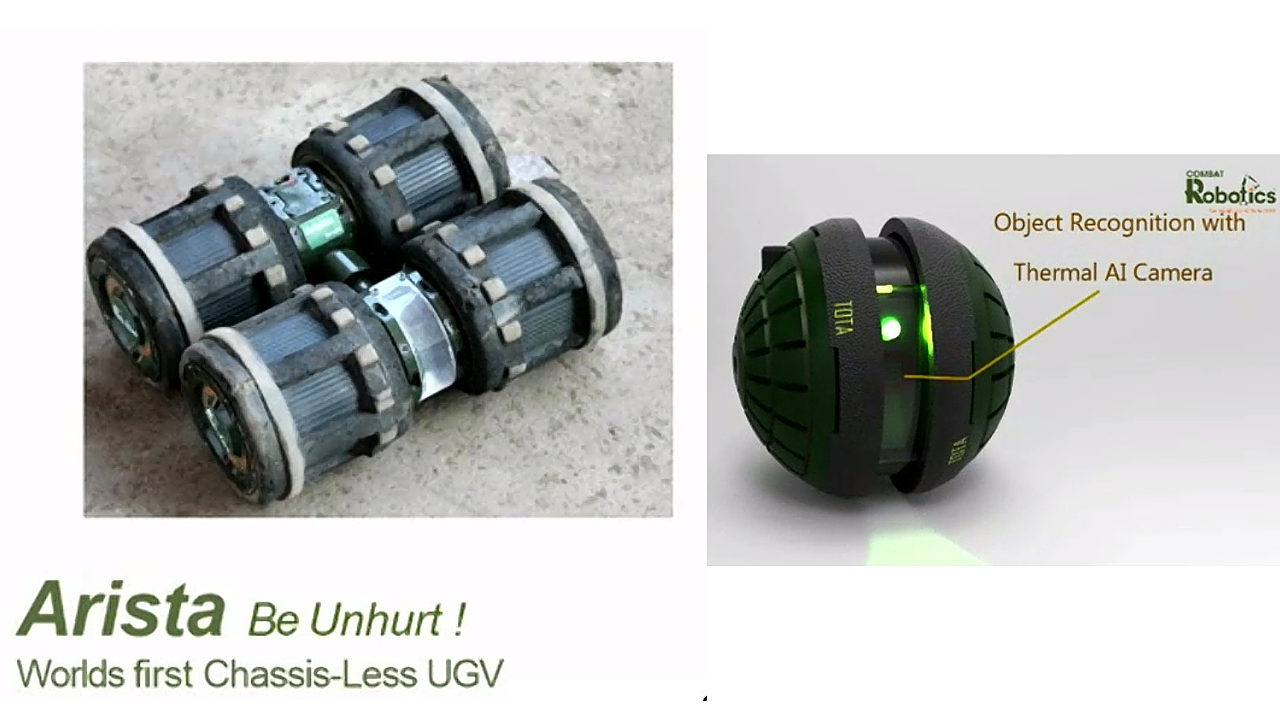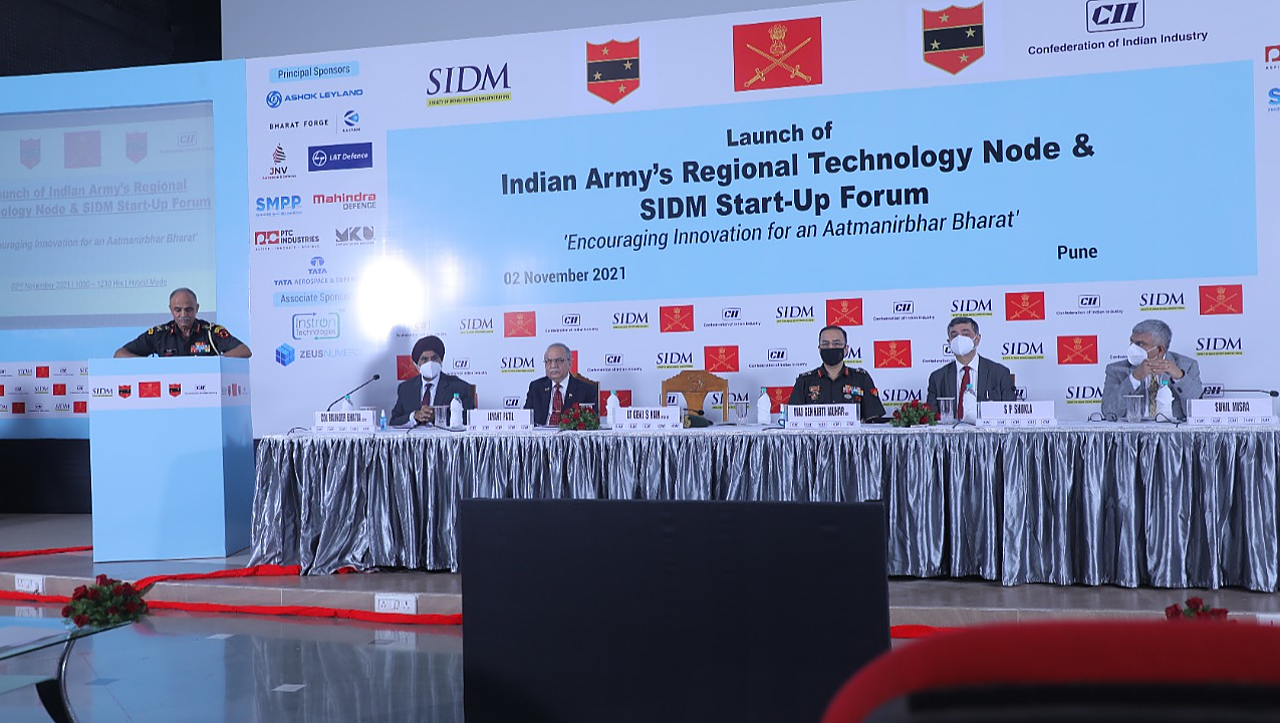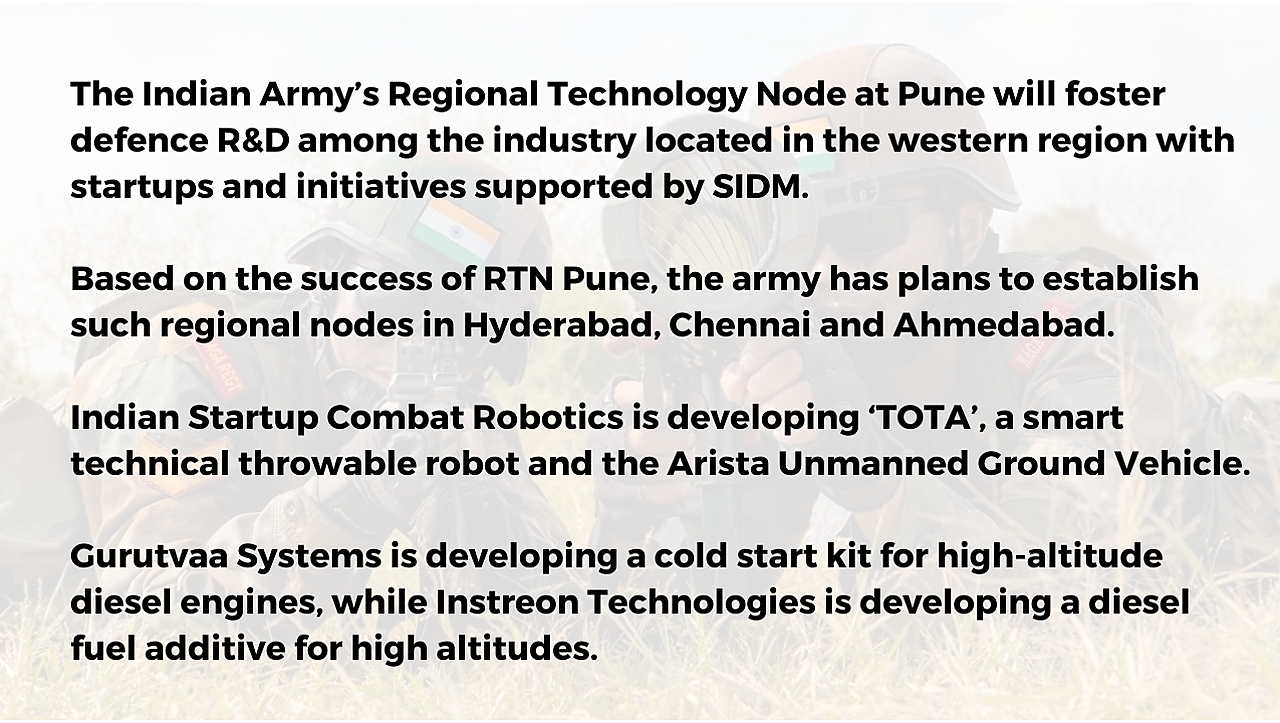
The launch of the Indian Army’s first-ever Regional Technology Node (RTN) at Pune earlier in November marked a significant landmark in the thrust towards greater partnership between the Indian armed forces and the nation’s defence industry.
The Society of Indian Defence Manufacturers (SIDM), which is the apex body of the Indian defence industry, also launched its ‘Start Up Forum’ on the same day, which is expected to provide a deeper interface between the Indian Army and startup firms seeking to meet its niche requirements. Showcased during the event were selected startups who made the cut with the army and will develop their offerings related to personal mobility and surveillance drones, and diesel fuel additives, to name a few.
The presence of the General Officer Commanding-in-Chief (GOC-in-C) Southern Command Lieutenant General JS Nain signalled the Army’s strong commitment to both new initiatives. RTN Pune will work with the Army Design Bureau (ADB), headed by Major General Kirti Jauhar as its Additional Director General, who was also present at the launch event. Brigadier S Sooraj BGS IS HQ Southern Command will head the RTN Pune, and its Officer-in-Charge will be Colonel Ashish Ramdas.

RTN Pune will foster defence R&D among the industry located in the western region with startups and initiatives supported by SIDM. It will also take forward the army's problem statements to the industry and defence startups while creating greater synergy amongst the military, defence manufacturers, R&D laboratories, academia and think tanks.
Other attendees at the event included Jayant D Patil, President SIDM, who is also Senior Executive Vice President for L&T’s Defence Business, SP Shukla, Vice President SIDM, who is also President-Defence at Mahindra Group.
Speaking about L&T’s experience with defence exports, Patil said that it was not given priority until 2014 due to existing policies, and at that time, it only exported non-lethal defence equipment to ten nations. Since then, however, L&T has been growing its defence exports portfolio, which crossed INR 1,000 crore in orders for the first time in 2016.
Startups To The Fore
The SIDM Start-Up Forum aims to inspire and facilitate innovators to actively participate in designing and developing various equipment and systems for the armed forces. The army has also shortlisted several startups that will develop products meeting its requirements.
Combat Robotics, a 2.5-year-old startup founded in Chennai, is developing a smart spherical robot as personal gear, which has now been selected for further development by the army. Called ‘TOTA’, the smart technical throwable robot will feature AI-based vision with a thermal feed and two-way communication. It can be used as a surveillance and reconnaissance tool to help plan high-risk missions or even aid in searching and rescuing individuals in confined spaces. Company officials said they are receiving support from the Indian Army’s College of Military Engineering. They have also presented to the Army Training Command and are also due to commence trials with TOTA at Pulwama. Company officials said that they are developing a real-time data transfer system, which can stream videos at low latency and that they have reached a prototype stage for the device with the 20% of the total work needed for the project already completed. Combat Robotics is also receiving assistance from a very prominent semiconductor device company to customise the chipset with a higher GPU and very high processing unit. TOTA will have a serrated cast iron shell and is designed to have three hours of endurance.
Combat Robotics is also developing the Arista Unmanned Ground Vehicle (UGV), which touts as the world’s first Chassis-less UGV. The innovative platform features an integrated motor drive, and the company is working on increasing the adaptability and agility to make it amphibious. With modular design, the Arista UGV is portable and easily deployable, offering high manoeuvrability in varied terrain. In addition, it has an endurance of three hours with fast-charging capability and live streaming.
Two other startups selected by the army are developing technologies for using diesel fuel at high altitudes. The army chose Pune based Gurutvaa Systems to develop a cold start kit for high-altitude diesel engines. The indigenously developed and field-proven system has demonstrated its ability to operate at minus 25 degrees Celcius and altitudes above 4,500m. Company officials said that it had already supplied similar cold start kits for high-altitude diesel engines to the Indian Air Force (IAF), and these are now in service.
An additive for diesel fuel to aid its use in high altitude areas is being developed by Instreon Technologies for the Indian Army. According to company officials, another year of development is needed to develop the diesel fuel additive and called for additional funding worth INR one crore to complete the project. The army requires a single additive to ensure the serviceability of vehicles and equipment at sub-zero temperatures and to ensure smooth replenishment of fuel at high altitudes. The additive should also be hazard-free during its storage and operability. At present, the army uses various types of fuels to support different altitudes and temperatures like standard diesel, diesel high pour points (winter & sub-zero).
The army also selected Drona Aviation, which showcased a palm-sized smart personal drone that is under development. This micro drone will provide the user/operator with images from confined spaces. Company officials say that they are striving hard to overcome numerous challenges associated with drones of such small size, including their limited endurance, as hovering over a particular area takes up 80% of its energy, which is further exacerbated by the weight of the payload to be carried. Autonomous operation while indoors is also challenging due to the large number of computations required to be done that needs expensive computer chips to be used. Company officials said that the initial prototype design of the autopilot had been completed along with the concept drone design, which will also feature collision avoidance and partial indoor autonomy. Drona Aviation’s flagship product Pluto helps students and tinkerers execute their drone projects and has sold approximately 8,000 such drones.

Forward-looking Initiative
Lieutenant General Nain said that the idea to establish the RTN at Pune had found immediate traction at the Army Head Quarters. Pune was chosen due to its existing industrial ecosystem, with the presence of Bharat Forge, Larsen & Toubro, Tatas and Mahindras. In addition, Bharat Electronics Limited and various Defence Research & Development Organisation labs are also located in Pune. According to Major General Jauhar, there are said to be over 3,200 startups already functioning in the Pune region, with about 2% of them focussing on niche technologies. The army has plans to establish more such regional nodes in Hyderabad, Chennai and Ahmedabad. The RTN will come under ADB - created to meet the army’s need to scan and promote indigenous defence manufacturing. In 2020, 90 startups were introduced to ADB, including 15 working on various projects with the army.
Army – Industry Partnership
In a significant indication of the army’s embrace of the private sector to drive defence innovation, Major General Jauhar said that the RTN would work at the regional level to facilitate access to army equipment and military ranges to aid startups in developing solutions meeting military requirements. According to Jauhar, RTNs' primary focus would be monitoring technology demonstrators and design development projects at various R&D institutions. It will scan individual innovators, nurture and connect them with the startup and the defence industry. Besides, it would identify military and dual-use technologies and look at the mature products addressing operational or logistic needs of the army. The RTN will evaluate such technologies and provide definite recommendations on how this technology would be employed or provide additional details for product development. Such initiatives will help Indian startups and MSMEs to develop India-specific indigenous defence solutions for the armed forces.